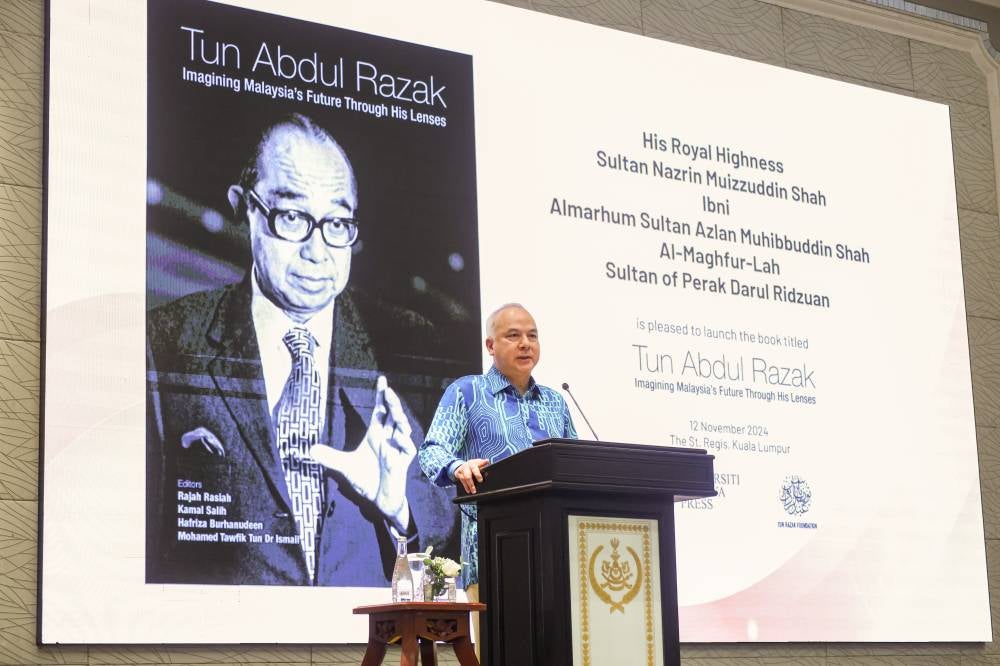Tun Razak’s greatest challenge was healing a nation shaken by 1969 riots - Sultan Nazrin
During his royal address at a book launch titled 'Tun Abdul Razak: Imagining Malaysia's Future Through His Lenses', Sultan Nazrin emphasised that Tun Razak achieved this not only through decisive actions but with an unwavering commitment to democratic principles.

SHAH ALAM - Sultan of Perak Sultan Nazrin Muizzuddin Shah, paid tribute to Malaysia's second Prime Minister, Tun Abdul Razak Hussein, emphasising his critical role in stabilising a nation reeling from the violent 1969 riots.
Sultan Nazrin, who also serves as the Deputy King, said that perhaps the greatest challenge Tun Razak faced was the need to heal a young nation deeply scarred by the riots of May 1969 and to prevent further unrest.
During his royal address at a book launch titled 'Tun Abdul Razak: Imagining Malaysia's Future Through His Lenses', Sultan Nazrin emphasised that Tun Razak achieved this not only through decisive actions but with an unwavering commitment to democratic principles.
As a longtime admirer of Tun Razak, Sultan Nazrin commended the former prime minister’s legacy, highlighting his integrity, vision and ability to guide the nation through challenging times.
"His bold vision and courage as a leader were equalled only by his integrity, work ethic and humility. I warmly welcome the approach of this book, which draws on Tun Razak’s legacy as inspiration to help us navigate today’s challenging times.
“It serves as both a worthy tribute to our ‘Bapa Pembangunan’ (Father of Development) and a practical guide, emphasising the importance of understanding our history to move forward effectively.
“A significant accomplishment of this book is its reminder that our country and the global community have faced and overcome similarly turbulent times before. With strong leadership, we have shown resilience in managing these challenges,” His Royal Highness emphasised.
Sultan Nazrin also highlighted how Tun Razak wielded his power with ethical responsibility, upholding democratic values even when given authority as the National Operations Council (NOC) director following the 1969 riots.
He added that Tun Razak’s worldview and values were built upon unwavering ethical principles, with democracy at their very core.
“He believed that if power was not quickly restored to the people through Parliament, the struggles for independence and against communism would have been in vain.
“Thus, while it was his capable leadership that steered us effectively through those difficult times, this was at all times underpinned by his commitment to the rule of law and democratic principles,” he said.
Sultan Nazrin also lauded Tun Razak’s willingness to embrace new talent, saying that he welcomed promising young leaders into his administration.
“Again and again, he proved himself to be the best kind of leader, the kind that calls for their power to be scrutinised and checked, while at the same time using that power to the very best of ends.
“He always prioritised what he felt was best for the country, and so welcomed brilliant new additions to his administration with open arms,” he added.
Earlier, Sultan Nazrin launched the book which honours the legacy of Tun Razak, also known as the country's Father of Development.
Raja Permaisuri of Perak, Tuanku Zara Salim was in attendance.
The book, co-edited by Distinguished Prof Datuk Dr Rajah Rasiah, Tan Sri Kamal Salih, Assoc Prof Dr Hafriza Burhanudeen and Mohamed Tawfik Tun Dr Ismail, provides a valuable new perspective on Tun Razak's contributions and highlights the enduring relevance of his policies, decisions, and actions for Malaysia's progress.
His Royal Highness said that the book's fourteen chapters also shed light on key policy choices and dilemmas Malaysia faces today and will encounter in an uncertain future, and also provide insights across various fields, from agronomy to education and emphasises leveraging technological advancements, including artificial intelligence (AI), to strengthen universities.











